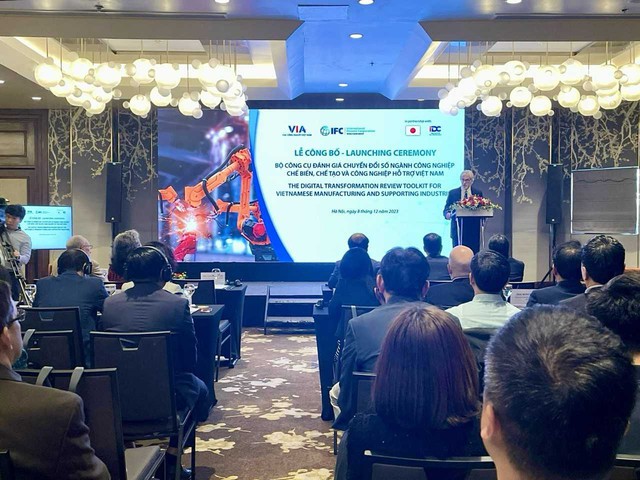Digital transformation review toolkit for manufacturing and supporting Industries makes debut
VGP - Viet Nam’s first-ever digital transformation review toolkit for manufacturing and supporting Industries was launched in Ha Noi on December 8.

The launching ceremony of the digital transformation review toolkit for manufacturing and supporting Industries, Ha Noi, December 8, 2023 - Photo: VGP
The toolkit is jointly developed by the International Finance Corporation (IFC) and the Viet Nam Industry Agency, under the Ministry of Industry and Trade, as part of the Digital Transformation Pilot Program.
A critical resource for industrial manufacturing sector in Viet Nam, the toolkit will help fast-track the local manufacturing and industrial supporting enterprises' journey towards smart and sustainable production models to boost international competitiveness.
Digital transformation is fast emerging as a game-changer for enterprises, as it offers the potential to gain efficiencies, improve sustainability and upgrade capacity from streamlined operations and automated processes.
Through leveraging advancements in analytics, artificial intelligence and Internet of Things, enterprises can optimize supply chains as well as accelerate innovation and product development.
This is specifically critical for Vietnamese producers joining global value chains as their multinational firm clients have raised the bar on suppliers to meet increasingly stringent standards in technical compliance, traceability, connectivity and transparency.
Speaking at the ceremony, Deputy Minister of Industry and Trade Do Thang Hai said, digital transformation is fundamental for manufacturers to continue to grow and integrate deeper into global value chains, and to develop a strong and modern national industry sector.
Amid the slow adoption of digital transformation by small and medium enterprises constrained by investment costs and knowledge gaps, this practical toolkit will allow enterprises to effectively implement digital solutions based on their capabilities and resources, Do added.
The toolkit incorporates international and regional best practices across seven dimensions of digital transformation, including strategy and leadership; people and culture; customers; operations; production; digital technology and security; and sustainability and inclusion.
It aims to help manufacturing firms develop tailored plans of action to address manufacturing 'pain points' and competitiveness constraints.
The toolkit represents an important step for Viet Nam's manufacturing sector on its journey towards digital transformation with an increased focused on sustainability, which is increasingly important to further integrate with global value chains and improve FDI linkages, said Thomas Jacobs, IFC Country Manager for Viet Nam, Cambodia and Lao PDR.
This toolkit is also unique in Viet Nam as it features a pilar focused on assessing enterprises' digitalization of their green transition and realize environmentally friendly business practices.
Through adopting digital transformation towards sustainability, suppliers can achieve efficient processes, increase decarbonization and become compliant with environment, social and governance (ESG) requirements of governments and customers.
These will enable local suppliers to effectively track and measure their carbon footprint to meet their climate commitments and those of their multinational company customers.
The Digital Transformation Pilot Program is implemented in partnership with the Japanese government, following the successful Supplier Development Program, which helped improve supply capabilities and long-term competitiveness for local manufacturers.
As a result, they could expand their business with international buyers and share of added value. This IFC-supported three-year pilot has now been scaled up and rolled out by the Ministry of Industry and Trade./.
